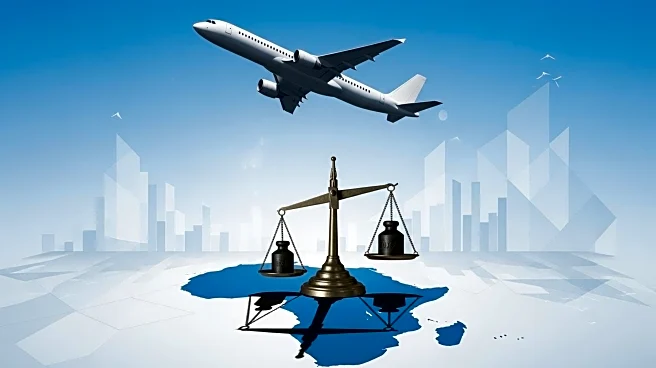What is the story about?
What's Happening?
The International Air Transport Association (IATA) has criticized African governments for imposing high aviation costs that are hindering the continent's aviation market growth. Kamil Al-Awadhi, IATA's regional VP for Africa and the Middle East, highlighted the fragmentation, high costs, and underdeveloped infrastructure as major constraints during the Aviation Africa 2025 summit in Kigali, Rwanda. Al-Awadhi noted that African governments are disconnected from the aviation industry, except when imposing charges or fees, which are sometimes 20 times more expensive than in other regions. He emphasized that 60-70% of every ticket in Africa goes towards taxes, charges, and levies, which damages the aviation industry and prevents reinvestment in infrastructure.
Why It's Important?
The criticism from IATA underscores the significant challenges facing the aviation industry in Africa, which is one of the fastest-growing markets globally. High costs and poor infrastructure not only limit the potential for economic growth but also deter investment and development in the sector. This situation affects airlines operating in Africa, leading to higher ticket prices and reduced competitiveness. The lack of government engagement and reinvestment in aviation infrastructure further exacerbates these issues, potentially stalling progress and innovation in the industry. Addressing these challenges is crucial for unlocking the continent's aviation potential and supporting broader economic development.
What's Next?
IATA's call for African governments to engage with the aviation industry suggests potential future discussions and negotiations aimed at reducing costs and improving infrastructure. Governments may need to reconsider their approach to aviation taxation and investment to foster growth and attract international airlines. Collaborative efforts between governments and industry stakeholders could lead to policy reforms and infrastructure development, enhancing the continent's aviation capabilities. The outcome of these discussions could significantly impact the future trajectory of Africa's aviation market.
Beyond the Headlines
The situation in Africa's aviation industry highlights broader issues of governance and economic policy on the continent. The disconnect between government actions and industry needs reflects challenges in policy-making and resource allocation. Addressing these issues requires a comprehensive approach to economic development, including better understanding of industry dynamics and long-term planning. The aviation sector's struggles may also serve as a case study for other industries facing similar challenges, emphasizing the need for strategic government-industry collaboration.
















